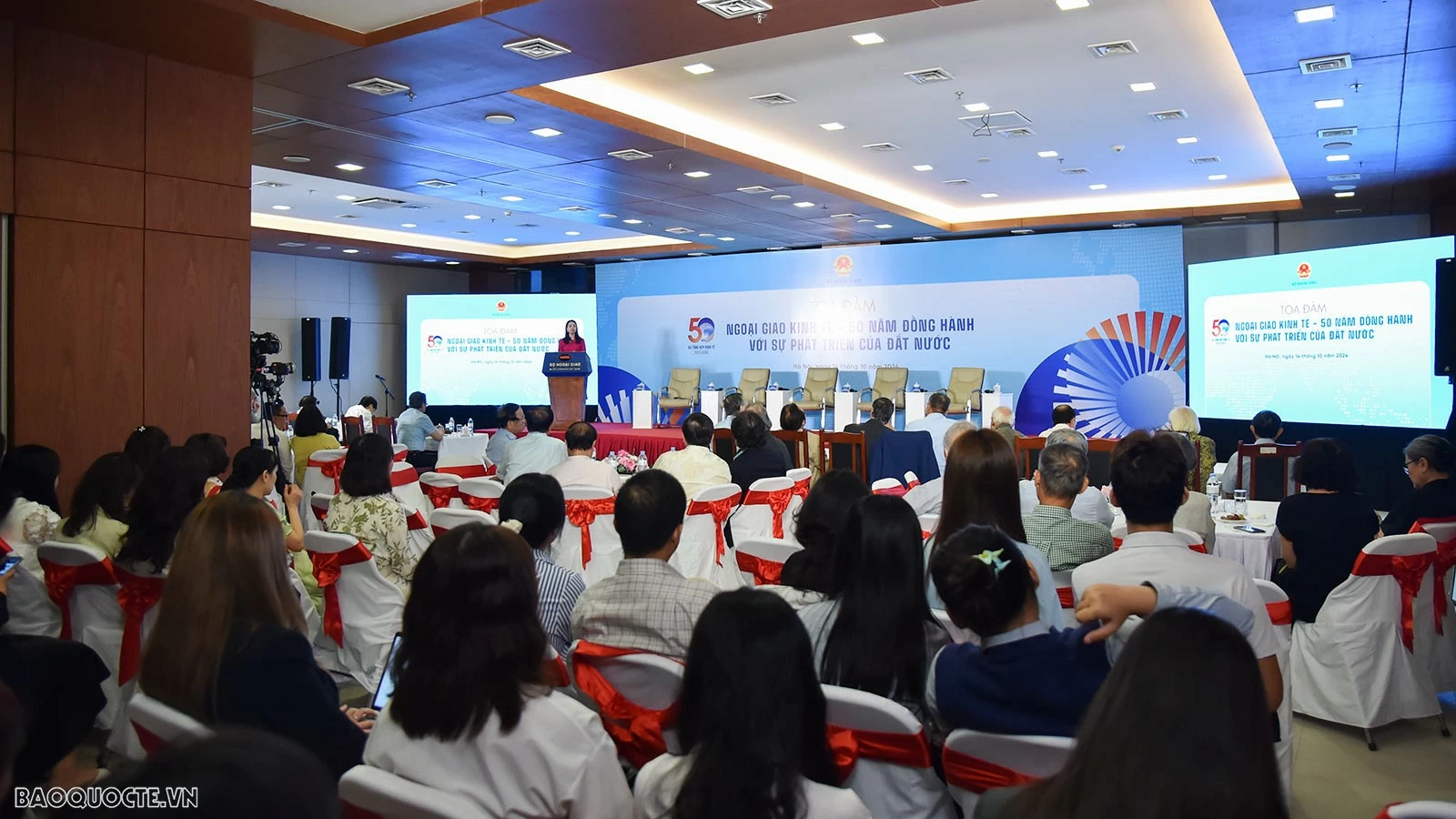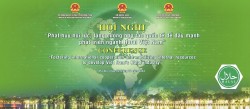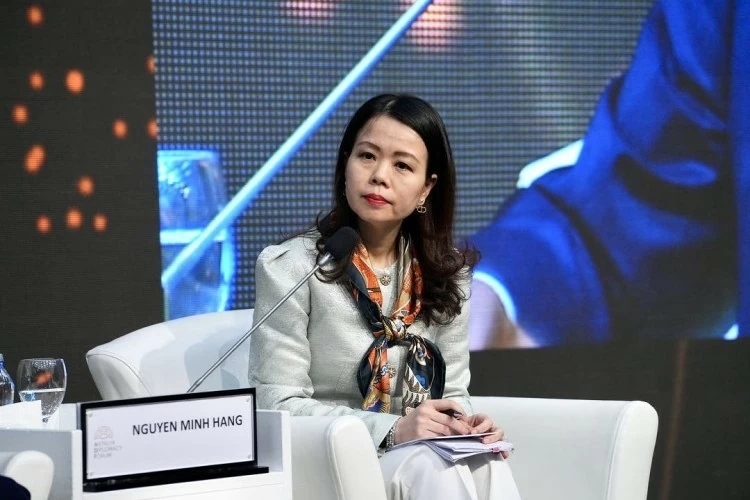
Halal - A New pathway and spearhead in the implementation of economic diplomacy
Latest
 |
| Deputy Minister Nguyen Minh Hang delivered a speech at the "Economic Diplomacy 50 Years Accompanying the Country's Development" seminar on October 14. (Photo: Tuan Anh) |
The Viet Nam Halal Conference, held under the theme “Fostering International Cooperation and Mobilizing Internal Resources to Develop Viet Nam’s Halal Industry,” is the first international conference on the Halal industry. Could you share the objectives, meaning, and significance of this event?
This is the first and most significant international conference on the Halal industry ever organized by Viet Nam. The event is essential for developing Viet Nam’s Halal sector and economy. With the participation and guidance of Prime Minister Pham Minh Chinh, the conference will welcome over 500 delegates, both in-person and virtual, from 50 countries representing major Halal markets worldwide.
| More from WVR |
 The first large-scale International Conference on Halal in Viet Nam The first large-scale International Conference on Halal in Viet Nam |
Initiated by the Ministry of Foreign Affairs, the conference is co-hosted by the Ministry of Science and Technology and the Ministry of Agriculture and Rural Development. It is also held with the active coordination of various ministries, departments, agencies, localities, institutes, associations, and businesses. The goal is to create tangible progress and effectively implement the project, “Enhancing International Cooperation to Build and Develop Viet Nam’s Halal Industry by 2030.”
Under the theme “Fostering International Cooperation and Mobilizing Internal Resources to Develop Viet Nam’s Halal Industry,” Viet Nam aims to convey the message, “Work together, grow together,” to Halal partners worldwide. Viet Nam seeks to maximize its strengths and comparative advantages to make substantive contributions to the global development of the Halal industry.
The Viet Nam Halal Conference is also the first to highlight the synergy between the “internal forces” of national potential and strengths and the “external forces” of practical cooperation with international partners to develop the Halal industry comprehensively and sustainably. The plenary and two discussion sessions will provide a holistic assessment of the potential, prospects, favorable conditions, and challenges in developing the Halal industry in Viet Nam. Delegates will also share experiences and strategies for building and advancing the Halal industry globally.
Through these discussions, the conference aims to propose recommendations and measures to support the professional development of Viet Nam’s Halal industry, enabling high-quality Halal products and services to integrate deeply into the global Halal market, particularly in critical sectors such as agriculture, tourism, textiles, pharmaceuticals, and cosmetics.
This conference can be regarded as a “golden opportunity” for Viet Nam to promote cultural exchange, build trust, and establish long-lasting partnerships with Muslim and non-Muslim countries worldwide. Through this conference, we believe that Viet Nam’s Halal industry will make significant progress toward securing a firm position on the global Halal map.
Viet Nam is well-positioned to engage deeply in the global Halal market. One key advantage is the strong leadership and guidance from the Party and State and the attention of localities and businesses. Could you assess the initial results we have achieved so far?
At a regular conference on economic diplomacy, Prime Minister Pham Minh Chinh said, “Drivers stem from innovation.” Following this motto, the Ministry of Foreign Affairs has taken the lead in proposing the mobilization of international resources to support the development of the Halal industry in Viet Nam.
At the beginning of 2020, the Ministry of Foreign Affairs, in collaboration with relevant agencies, hosted forums and conferences both inside and outside Viet Nam to conduct a fair assessment of the potential and prospects of the global Halal market and Viet Nam’s strengths and opportunities.
Based on these efforts, the Ministry of Foreign Affairs recommended that the Prime Minister identify international cooperation as a key priority in developing the Halal industry. The Prime Minister’s issuance of the project “Enhancing International Cooperation to Build and Develop Viet Nam’s Halal Industry by 2030” (the Halal Project) on 14 February 2023 has paved the way for more significant resource mobilization to foster the growth of the Halal industry in Viet Nam.
 |
| Deputy Minister Nguyen Minh Hang attended and delivered a speech at the Antalya Diplomatic Forum (ADF) 2024 in Türkiye on March 2, 2023. |
Built on the Halal Project, the Ministry of Foreign Affairs has actively developed action plans to coordinate with relevant ministries, departments, agencies, localities, associations, and businesses to enhance international cooperation on Halal systematically and professionally. We consider Halal a new pathway and spearhead of Viet Nam’s economic diplomacy, as specified below:
First, we actively incorporate Halal cooperation into foreign activities at the high level and other levels, making Halal a new sector of collaboration between Viet Nam and Muslim and non-Muslim countries and international organizations.
Second, we bolster sectoral international cooperation by signing and implementing agreements and MoUs on Halal cooperation between Viet Nam and several key Muslim and non-Muslim partners.
Third, we strengthen the promotion and advertisement of Halal products while supporting Vietnamese businesses and localities in establishing connections with global Halal partners.
Fourth, we enhance communication efforts to educate and raise awareness among localities, businesses, and the public about Halal through various formats, such as special Halal publications, dedicated Halal columns in the World and Viet Nam Report, and promoting Halal content on electronic media.
Fifth, we coordinate with relevant agencies to improve Viet Nam’s legal framework, state management policies, and laws and regulations related to Halal standards and certificates. In particular, we are working on establishing the first Viet Nam Halal Certification Authority (HALCERT) and developing a national set of Halal standards.
Over the past years, the Ministry of Foreign Affairs has showcased its pioneering role in building and implementing the Halal Project. What are the challenges facing us, and what are the new opportunities for Vietnamese localities and businesses as they participate in the global Halal market in the future?
As the Ministry of Foreign Affairs was tasked with presiding over developing and implementing the project “Enhancing International Cooperation to Build and Develop Viet Nam’s Halal Industry by 2030,” we have identified five significant challenges facing Viet Nam as it joins the global Halal market.
First, Vietnamese management agencies at both the national and local levels and Vietnamese businesses have not been well informed about the global Halal market, trade regulations, business and consumption practices, Muslim culture, and particularly the requirements for Halal standards and Halal certification.
Second, there is no fully developed legal framework for Halal products, services, and certification in Viet Nam, constituting a necessary criterion for systematically, professionally, and sustainably designing the Halal industry.
Third, a unified Halal ecosystem has not yet taken shape in Viet Nam. We do not have a manufacturing facility, distribution, or wholesale system for Halal products, hotels, or tourist destinations that meet Halal standards.
Fourth, multiple businesses and localities are encountering difficulties in acquiring Halal certificates. Certification fees are high, the certificate expires after a certain period, and no global standard certification system exists.
Fifth, Viet Nam does not have sufficient human resources to meet the demand for a Halal export industry.
As soon as we overcome these challenges, I am confident that Viet Nam will have many advantages in integrating profoundly and effectively into the global Halal market.
The global Halal market offers vast potential, with over 2 billion Muslims in 2024 and an expected economic size of 7.7 trillion USD in 2025. The Halal industry spans various sectors, including food, beverages, pharmaceuticals, cosmetics, tourism, fashion, recreational media, and Muslim finance. The halal consumption market extends globally, encompassing both Muslim and non-Muslim countries. The spending and use of Halal products is rising, as consumers are Muslims and non-Muslims, drawn by Halal’s high standards in food safety, quality, and environmental protection.
With close attention and guidance from the government and the Prime Minister, I believe that Viet Nam will develop a comprehensive and sustainable Halal industry, further deepening its integration into the global Halal market. At the same time, Halal cooperation will become an important area and a new driver in advancing deep, substantive, and effective collaboration between Viet Nam and its partner countries, contributing to the shared prosperity of Viet Nam and other nations.
Thank you, Deputy Foreign Minister!









